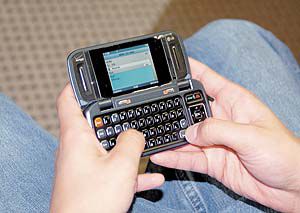| Local students appear to be adapting to the electronic device policy implemented by the board of education. The policy specifies that any battery run electronic device used during school hours which has interrupted class will be taken away and will not be given back until the student pays a $25 fee. The guidelines define school hours as Monday through Friday from 8:24 a.m. to 3:03 p.m. After an electronic device has been taken away from a student a second time, the fee for recovering the item raises to $50. The money collected from the students for the return of electronic devices goes to the school district. |
Slightly more than one month has passed since the Carbon County Board of Education implemented a no electronics policy after the devices had become a nuisance in local schools.
The policy specifies that any battery run electronic used during school hours which has interrupted class will be taken away and will not be given back until the student pays a $25 fee.
The guidelines define school hours as Monday through Friday from 8:24 a.m. to 3:03 p.m.
After an electronic device has been taken away from a student a second time, the fee for recovering the item raises to $50.
The money collected from the students for the return of electronic devices goes to the school district.
The first couple of weeks were difficult for the studentbody to adjust to, especially at lunch and in the halls.
Candice Jackson indicated that she was walking in the hall after sixth period and on the phone with her grandmother when a teacher confiscated the electronic device.
“I’m definitely still going to text,” said Jackson. “I can understand the schools not wanting us having our cell phones in class, but I think it’s ridiculous.”
Many students disagree with the policy because they can’t use the electronic devices that they have relied on.
Other students feel the policy is being taken to the extreme.
Electronics aren’t allowed on campus during school or in-between class time like lunch, going to and from lockers, and in the parking lot, the risk of danger can increase for students on phones while driving.
Venyce Martinez believes the new policy will increase dangers in the vehicle for students who drive.
“I understand the policy, but not being able to use our phones at lunch is ridiculous. It encourages us to leave school for lunch which equals us using our phones while driving and is far more disruptive then using them in the halls,” said Martinez.
People in general have become attached to electronics and the devices may cause problems while driving.
Many states are creating laws that prohibit cellular phone usage while driving. But the states allow motorists to use blue tooth – a device similar to headphones that allows people to talk without holding phones.
According to Legal Match.com, there are currently no nationwide federal laws about phone use while driving motor vehicles.
But individual states across the country are free to pass cell phone and driving regulations.
Currently, Connecticut, New York and New Jersey have passed guidelines completely banning the use of all hand-held cellular phones while driving.
Illinois, California, Massa-chusetts, New Mexico, Ohio, Pennsylvania, Colorado, Dela-ware, Tennessee, Maine and Florida have partial bans.
As cell phones become an increasing problem in schools and on the roads, some local student have no problem with adjusting to the district’s policy.
“The new policy is only teaching us to become more secretive. Lots of people I know still text and have their phones, but now they make sure they can’t be seen,” pointed out Stevie Snyder.
Many school districts have set policies on cell phones and electronics.

